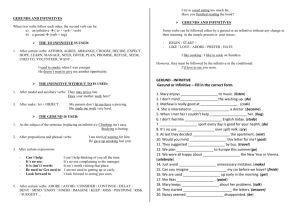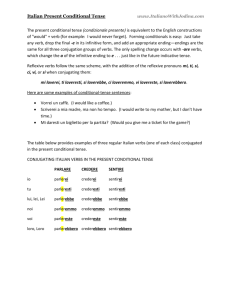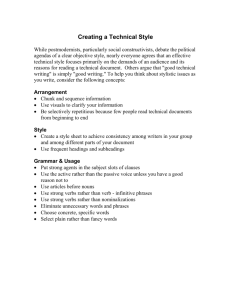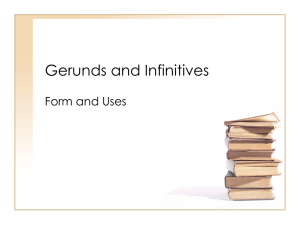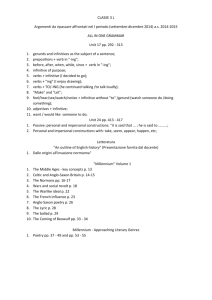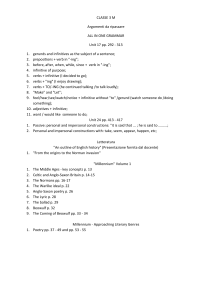present simple
advertisement
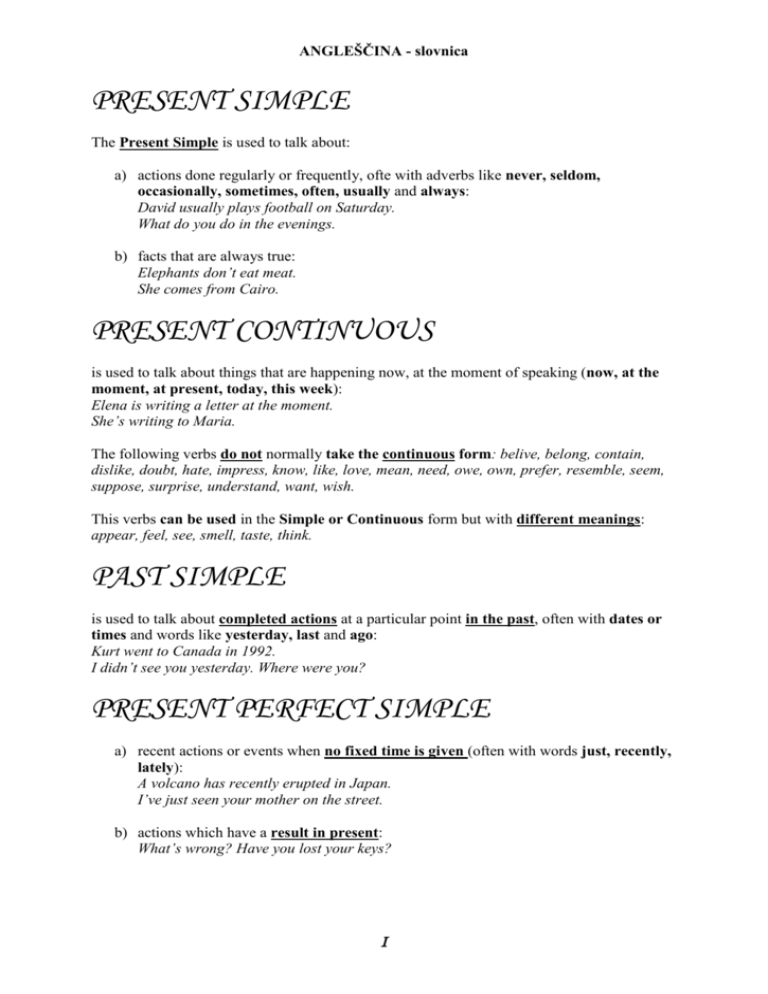
ANGLEŠČINA - slovnica PRESENT SIMPLE The Present Simple is used to talk about: a) actions done regularly or frequently, ofte with adverbs like never, seldom, occasionally, sometimes, often, usually and always: David usually plays football on Saturday. What do you do in the evenings. b) facts that are always true: Elephants don’t eat meat. She comes from Cairo. PRESENT CONTINUOUS is used to talk about things that are happening now, at the moment of speaking (now, at the moment, at present, today, this week): Elena is writing a letter at the moment. She’s writing to Maria. The following verbs do not normally take the continuous form: belive, belong, contain, dislike, doubt, hate, impress, know, like, love, mean, need, owe, own, prefer, resemble, seem, suppose, surprise, understand, want, wish. This verbs can be used in the Simple or Continuous form but with different meanings: appear, feel, see, smell, taste, think. PAST SIMPLE is used to talk about completed actions at a particular point in the past, often with dates or times and words like yesterday, last and ago: Kurt went to Canada in 1992. I didn’t see you yesterday. Where were you? PRESENT PERFECT SIMPLE a) recent actions or events when no fixed time is given (often with words just, recently, lately): A volcano has recently erupted in Japan. I’ve just seen your mother on the street. b) actions which have a result in present: What’s wrong? Have you lost your keys? I ANGLEŠČINA - slovnica c) actions in a period of time which is not yet finished, and experiences in someone’s life so far, often with yet, so far, ever, for and since: I haven’t recieved any letters this week. She has visited New York five times. Have you ever been to Morocco? PRESENT PERFECT CONTINUOUS is used to talk about actions which started in the past and are still happening, or which have recently stopped but have a result in the present: I’ve been waiting here for ten minutes. Your eyes are red. You haven’t been crying, have you? PAST CONTINUOUS is used to talk about continuous actions which are interrupted by a Past Simple action: I was having my breakfast when the police arrived. It’s also used for descriptions and to set the scene when telling a story: It was raining hard as I walked down the road. PAST PERFECT SIMPLE is used to show that a completed action happened before something else in the past: I telephoned Jane at 8.00, but she had already left home. But if two past actions are close in time, or closely connected, the Past Perfect is not usually used: When he arrived at the hotel, he asked for a room. PAST PERFECT CONTINUOUS is used to show that there had been a continuous or repeated action before sth else in the past: I was very angry when the bus finally came, because I had been waiting a long time for it. FUTURE Will and shall are used to express: a) predictions: I think he’ll get a job (I think). b) instant decisions: The phone is ringing. I’ll answer it. c) offers of help: I’ll help you with that, shall I? d) promises: I’ll write to you every day. e) invitations and polite requests: Will you come to my party? II ANGLEŠČINA - slovnica The short forms I’ll and we’ll are usually used in spoken English. Shall is usually used only with I or we, and its main use is in offers of help or suggestions: Shall I make you a cup of tea? Shall we book the tickets now? The Present Continuous is used for planned future arrangements (100% - somebody decides and does something): He’s flying to Paris tomorrow. I can’t see you tonight. I’m visiting my aunt. Going to is used to talk about: a) things you intend to do: I’m going to buy a new car. b) predictions based on something in the present: Look! He’s going to win the race. I’m going to be sick. It’s going to rain tomorrow. – the sientists say this The Present Simple is used to talk about timetables, programmes of events and people’s schedules: The train leaves at 10.00. What time do we arrive in New York. The Future Continuous (will + be + -ing) is used for a future activity at specific time in the future: At 3.20 we’ll be having our break. The Future Perfect (will + have + past participle) is used when you are looking forward to a finished action at a specific time in the future: By 3.30 we’ll have finished our break. Future Possibility (may/might) – 50% sure Do not use: !!!maybe I will!!! CONDITIONALS The Zero Conditional is used for a situation which is always true: If water is colder than 0*C, it freezes. The First Conditional is used for a possible future action which depends on another action: If he works hard, he will pass the exam. We’ll get on time if we leave now. The Second Conditional is used for an imaginary situation, where the meaning is in present: If I had more money, I would buy a new car. (I haven’t got enough money at the moment.) III ANGLEŠČINA - slovnica It can be also used for a remote possibility in the future: If I won the competition, I’d go on a world cruise. It’s also used for giving advices: If I were you, I’d stay at home. The Third Conditional is used for an imaginary situation referring to a past action: If he hadn’t stolen the money, he wouldn’t have gone to prison. (But he stole the money, so he went to prison.) Notice this “mixed” Conditional sentence: If he hadn’t stolen the money, he wouldn’t be in prison. (But he stole the money, so he is in prison now.) !!!Remember!!! Unless means If not !!! Do NOT use will after if !!! When can be used instead of if, but only if it is certain that something will happen: When he arrives, I’ll thank him. (I know he is going to arrive.) Do NOT use will after when, after, before, as soon as, until, till and while. When they are used to refer to a real future action, they take the same structure as the First Conditional. The Present Perfect can sometimes be used after them: I’ll wait here until the doctor arrives/has arrived. Ø ZERO CONDITIONAL FIRST CONDITIONAL SECOND CONDITIONAL THIRD CONDITIONAL TENSE IN THE “IF” CLAUSE Present Simple Present Simple Past Simple Past Perfect TENSE IN THE MAIN CLAUSE Present Simple Future (will) Would + Infinitive without to Would + Have + Past Participle PASSIVES The passive is used to describe an action when is not so important who or what did the action, or when we do not know: Mike’s car was damaged in an accident. (Act: Someone damaged Mike’s car in an accident.) It is often used to describe sientific processes: The water is filtered before it is mixed with the chemicals. IV ANGLEŠČINA - slovnica The object of a active sentence becomes the subject of a passive one; the verb be is used in the same tense of the verb in active, with the past participle of the relevant verb. By is only used if a name, or a noun givin necessery information, is included: Act.: The guide showed him round. Pass.: He was shown round by the guide. Note the very common passive: She was born in Zurich. REPORTED SPEECH Reported Speech is used to report to a third person what someone else said. To change sentences from Direct Speech to Reported Speech, the pronoun, tense and time phrase may be all changed: “I’m working tonight,” Daniel said. (Direct) Daniel said (that) he was working that night. (Reported) In Reported Speech using 2nd and 3rd Conditional sentences, the tenses are not changed: “If you went to bed earlier, you wouldn’t feel so tired in the morning,” said his mother. His mother told him that if he went to bed earlier, he wouldn’t feel so bad in the morning. Verbs that report what sb said are used with the infinitive (to do) or the gerund (doing). INFINITIVE Ask Warn Persuade Threaten Seem Tell Advise Beg Need GERUND+preposition Accuse of Apologise for Regret ø Insist on Introduce to Discourage from Protect from Remind of Congratulate on Blame for Thank for Mistake for Prevent from She suggested we should all go... V ANGLEŠČINA - slovnica GERUND or INFINITIVE? I. always GERUND: 1. after prepositions: I’m good at… We are thinking of… I’m interested in… I’m looking forward to… I can’t get used to… After… 2. after certain verbs: enjoy, deny, avoid, admit, finish, can’t stand, don’t mind, adore, give up, keep on, can’t stop, can’t help II. always INFINITIVE: 1. after certain verbs: can’t afford, hope, didn’t mean, agree, attempt, choose, learn, manage, need, dare, offer, decide, promise, expect, refuse, help, seem, want, long,… 2. X someone to do something: X: advise, invite, allow, remind, encourage, teach, order, tell, persuade, force, want, ‘d like (‘d love, ‘d prefer, ‘d hate), ask, beg, expect, help, need I advised him not to go out. 3. after make let and allow: 4. after certain adjectives: difficult, impossible, pleased, surprised, lucky, easy, good, nice 5. to express purpose: I came here to meet you. III. GERUND or INFINITIVE? 1.Continue, start, begin: Both forms are possible: the infinitive is more common. If the verb is in a continuous tense we prefer the infinitive. He began working/to work when he was twenty. She continued ironing/to iron. VI ANGLEŠČINA - slovnica It’s starting to rain. Be careful – some verbs do not take the continuous form (the list is on page I) 2.Like, love, hate, prefer: Use the infinitive, except when f.ex. like has a very general meaning. I like to read a book before going to sleep. – specificated when I like cooking. – very general meaning 3.Remember, forget, regret: The gerund refers to an action happened before the act of remembering, forgetting or regretting. I remember eating in this restaurant. I’ll never forget meeting you. I regret lying to her. The infinitive refers to an action that takes place after the act of remembering, etc… I must remember to buy some flowers. Don’t forget to lock the doors. I regret to tell you that you have failed. 4.Stop: The gerund refers to an action which was happening before the act of stopping. We stopped playing tennis because it got too dark. The infinitive tells us why the action stopped, and what happened next. We stopped to have a break. 5.Try: The infinitive refers to the aim we want to achieve. I tried to learn Chinese, but it was too difficult. The gerund refers to the methods we used to achieve the goal. I even tried to go on evening classes. I WISH AND IF ONLY I wish and If only are both used when the speaker would like a situation to be different. For a wish about the future, use would ot could: I wish I could go to the party tomorrow. (I want to go, but I can’t.) If only it would stop raining! VII ANGLEŠČINA - slovnica Would is often used when the speaker is complaninig about something: I wish she wouldn’t use my phone so much. I wish you would be quiet. DO NOT use I would or We would after I wish/we wish or If only I/we!!! For a wish about the present, use a past tense after I wish and If only: I wish he didn’t smoke so much. (He smokes a lot.) If only Ihad a car. (But i haven’t got one.) Were instead of was is often used after wish and If only: I wish he were here with me now. For a wish about the past, use the Past Perfect after wish and If only to express regret: She wishes she had married him. (But she didn’t marry him.) If only I hadn’t been so nervous. (But I was nervous.) DO NOT use would have after wish and If only!!!! DIFFICULT VERBS Make someone do something means to oblige or fotce them: My parents made me study hard when I was young. (active) I was made to study hard when I was young. (passive) Let and allow mean to give permission for something to happen: He let me drive his car. He allowed me to drive his car. (act.) I was allowed to drive his car. (pass.) Notice that there is no to before the infinitive in the active construction with make or let. There is no passive construction for let. Generally speaking , do is used with nouns expressing work, a duty or an obbligation: •do your homework •do the washing-up When make is used with nouns, it often means to produce ot create something new, which did not exist before: •make a cake •make a plan •make a mistake Used to do expresses a habit in the past which is finished now. In this expression, used to is a verb in the Past Simple: We used to wear uniform at school. I didn’t use to like curry. VIII ANGLEŠČINA - slovnica Be/get used to means be/get accustomed to doing sth, or to acquire a habit over a long time. In these expressions, used is like an adjective: Antonetta has got used to eating dinner late in Spain. (This was rather strange for her when she first arrived.) Be/get used to can be also followed by a noun: It took her a long time to get used to the food. Lie(lying), lied, lied – not to tell the truth: He’s always lying to the people. Lie(lying), lay, lain – to be horizontal: She lay there in the sun for hours. Lay(laying), laid, laid – to put sth down: He laid the child gently on the ground. Rise(rising), rose, risen – takes no object: Prices rose last year. Raise(raising), raised, raised – takes an object: He raised his hand. PREPOSITIONS The prepositions at, in and on are used in expressions of time: •at 4.30, at Christmas, at night, at the weekend, on Monday, on 4th June, on my birthday, in the morning/afternoon/evening, in April, in 1967, in (the) spring/autumn/summer/winter They are also used in expressions of place: •(stay) at home, at 318 Oxford Street, in Birmingham, in Africa, on the beach Note that you can arrive at or in somewhere, but not to!!!!!!!!! Some important adjectives and nouns with their prepositions are: •attitude towards, aware of, capable of, confident of, crowded with, difficulty in, envious/jelous of, fed up with, guilty of, intention of, interested in, keen on, key to, point in, possibility of, pride in, proud of, reason for, result of, solution to, surprised at, suspicious of, typical of Some common verbs with their prepositions are: •accuse someone of, apologize for, blame someone for, concentrate on, congratulate someone on, depend on, forgive someone for, insist on, object to, prevent someone/sth from, succed in The -ing form normally used after an adjective, noun or verb plus preposition: We forgave him for lying to us. Note that there is no preposition after these verbs: •ring, phone, discuss, divorce, marry, lack, tell The same preposition is often used after adjectives or verbs with a similar or opposite meaning: •care, worry, be anxious about (the child) •ready, prepared for (school) •married, engaged, related to (that girl) •good, bad at (swimming) •approve, disapprove of (his friends) •angry, annoyed, irritated, furious with (him) •apply, send, ask for (information) •frightened, afraid, scared of (the dog) •agree, disagree with (them) IX ANGLEŠČINA - slovnica CONJUNCTIONS The linking words or conjunctions although, however, but, despite, in spite of, even though and though are used with different structures: Although it was raining, he went for a walk. It was raining. However, he went for a walk. It was raining, but he went for a walk. Despite the rain/In spite of the rain he went for a walk. In spite of/Desoite the fact it was raining, he went for a walk. Even though it was raining, he went for a walk. (a stronger form of although) It was raining. He went for a walk, though. (more common in spoken English) Note that despite and in spite of can only be followed by a noun or a gerund. The gerund can only be used if the saubject of both parts of the sentence is the same: Despite winning the scholarship, he could not afford to go to university. Other useful conjunctions are to, in order to (expressing purpose), and (which links clauses of equal importance), because, as, since (used to give reasons), when, as, since (referring to time), if, unless (used in Conditionals) and so/such.......that (expressing result): As it was my turn, I paid the drinks. He’s been ill since she arrived. In case does not mean if. It refers to the possibility of something happening. Use either a Present or Past tense after it. Do not use will: Take a key in case the door is locked. (It’s possible that it is locked.) I didn’t offer to help in case I offended him. (I might have offended him.) It’s time is used to say that something should be done because the time to do it has come. It is not used with future tenses. There are two ways of using it, with the same meaning: •It’s time for us to go home •It’s time we went home. MODAL VERBS Will, would, shall, should, can, could, may, might, must and ought to are called modal verbs. They do not have other forms and do not use do/did to make a question or a negative. Note the short forms: will not = won’t, shall no = shan’t, cannot = can’t. All these verbs except ought to take the infinitive without to: You must stay. They can’t come. We won’t see him. Instead of can , you can use be able to in all tenses: I’ll be able to get my visa later. He was able to marry her after all. Instead of must, you can use have to in all tenses: He had to be punished. It’s all right, you won’t have to say anything. X ANGLEŠČINA - slovnica You mustn’t is a negative imperative, similar to don’t: You mustn’t play football in the road. It’s dangerous. You needn’t means the same as you don’t have to, it isn’t necessary. Modal verbs are often used when we suppode that something is or isn’t true, taking into account all facts available. Must is used when we assume something is true: You haven’t eaten all the day. You must be hungry. Can’t is used when we suppose something is impossible: Those results can’t be right. You must have made a mistake. May/might are used when sth is possible, but we are not sure about it: Janice my be here. T’m not sure. He might be able to help, but I can’t promise. Note what happens if we are referring to something in the past: He must have got the job. You can’t have lost your passaport. Thay might have signed the form already. Could is used to express possibility in a similar way to may/might: This could be the house we are looking for. Could is also used express general ability in the past: She could swim when she was five. Was able to/managed to/succeded in are used for a particular achievment in the past: They all managed to pass the entry test. Couldn’t can be used for both general and particular situations. XI
